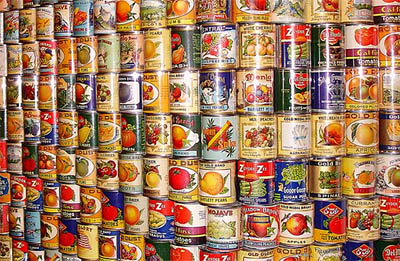Food Storage and Food Rotation Challenges
It’s one thing to buy and store extra food to keep as part of your emergency preparedness food storage inventory, but it is quite another to keep it organized and to rotate it in a practical way to ensure no waste from spoilage over time.
I’m sure that most everyone who has built up a supply of food storage has had this problem, and maybe still do!
Store what you eat
Experienced preppers have heard this a million times, and those who are just beginning, maybe not…
Store what you eat and eat what you store.
Once you’ve heard it, you say to yourself… “that makes sense”. But do you actually do it?
It makes sense that your food storage inventory should consist of a good portion of the foods that you normally eat. Otherwise they’re more likely to just sit there and collect dust while they age.
Where are you storing all of your extra food? Is it scattered about haphazardly in various cupboards, drawers, pantry shelves, boxes, bins, basement, nooks and cranny’s, etc..? Do you even know all of what you have?
A result from a lack of food storage organization is that food items will be forgotten while their expiration date is ticking closer. Granted, many foods are still safe to eat well beyond the indicated date or ‘best used by’ date, etc., but if you had a food rotation system that would enable you to use your inventory such that what goes in first will be used first, ‘first in – first out’, you will eliminate this issue!
Keeping your food in different locations is not such a bad idea (in fact it’s a good idea to diversify), but when your food storage is scattered around in different locations, it makes it more difficult to use it and rotate it properly. To overcome this challenge you might consider a tracking method of sorts… write down what you have and where it’s located. Maybe you don’t need to detail every little thing, but to at least track the categories of what you have, etc…
When you are buying extra food, be reasonable about how much you accumulate, based on its realistic shelf life. Some foods will waste sooner than others, so maybe you shouldn’t store too much of that as other items.
One way to look at it is this… Lets say you’re dehydrating a-lot of vegetables right now and storing them in your food storage. Come winter time, you should start eating them! Don’t let them sit there. If you’ve stored enough, it will last you all winter, into the spring and summer until your next crop, or until you buy more fresh produce during that time of year. Rotation. Dehydrate the vegetables that you will eat. If you don’t like to eat peppers, then don’t dehydrate peppers!
For a successful food storage, you need to focus on storing the foods that you normally eat and you need to focus on tracking and using the inventory.

